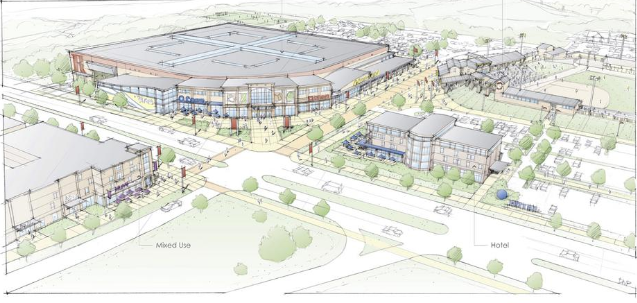Students explore the questions: Should the Rock Really Expand on a Landfill?
March 23, 2018
Environmental Science students learning about Urbanization and Population Growth created a project involving the expansion of the Rock in Franklin and the effects their plans could have on the community.
“The inspiration for this project was just that we were all curious to learn a little more about the expansion and its effects on the environment, and it all just morphed and took shape from there,” Environmental Science teacher Katie Welsch said.
The Rock plans to expand on a landfill. This construction, though, has many potential hazards for the environment, such as toxins rising. An excerpt from the article The Problem with Landfill from Environmentvictoria.org reads the following:
“When organic material such as food scraps and green waste is put in landfill, it is generally compacted down and covered… Eventually this releases methane, a greenhouse gas that is 25 times more potent than carbon dioxide… Methane is also a flammable gas that can become dangerous if allowed to build up in concentration.”
Teacher and community involvement was necessary in the project; this way, public opinion could be shared and students could learn more about the effects. Junior James Laskowski explains that the project doesn’t seem to be dangerous to the environment due to the fact that an environmentalist is helping out.
“We had to write an effective survey, send it out, and do research on what the Rock planned to build and how it would impact the environment. We learned that the Rock has an environmentalist who has been working with them on the expansion,” he said.
Senior Aishah Cartagena received mixed results from the surveys.
“It was pretty much half supported it and half didn’t. I found that the people that supported it went to the Rock often for winter sports. The ones that didn’t, questioned its purpose and if it was going to be expensive and harmful to animals,” she explained.
Rock owner Mike Zimmerman had people walk around door-to-door to community members to ask about what they would think about the expansion.
“Frankly it didn’t go well. It signaled to us we needed to spend more time being respectful of our neighbors to solicit their input and thoughts,” Zimmerman said in an article on jsonline.com.
Jane Ford-Stewart, a writer for the Milwaukee Sentinel, describes how Robert Knoll and other neighbors feel about how the toxins could affect them.
“He and other neighbors worry the sheer weight of all the proposed Ballpark Commons buildings could push the methane gas past the underground collection system and into neighborhoods where it could enter homes again,” Stewart said in an article on jsonline.com.
Stewart also quoted Stephanie Leranth, a neighbor to the Rock, about the noise level they create.
“Try having a vacuum cleaner follow you four hours straight. Try having guests come over and having a vacuum cleaner follow you around,” Lenranth said.
Stewart describes the plans Zimmerman wants to construct.
“Zimmerman would like the additional land to add a stadium where the University of Wisconsin-Milwaukee baseball team and perhaps a minor league team could play. Also, multi-story commercial buildings with restaurant space and offices above, a building with stores and a restaurant downstairs, apartments on the upper floors, an indoor sports facility with an attached store and restaurant space, an indoor/outdoor golf center, and retail and restaurant buildings on out lots near the other buildings,” Stewart said.
Despite the mixed reviews that Laskowski heard, he finds the plans to sound really exciting.
“I think they should build it because it would be cool and I would use it a lot,” he said.
Welsch feels that sharing information of the Rocks’ plans was an effective idea for not only the community, but for the students learning this unit.
“I think it helped students and the community by sharing information about the expansion. It was something that collectively as a class we did not know a lot about, and wanted to learn more,” she said. “It also worked to talk about it in terms of urbanization, population growth, and the environment.”
Cartagena believes that the community sees the expansion as a benefit for leisure, but ignores the results it could have on the environment.
“I think a lot of people don’t think about the environmental issues going on in our community. They want the Rock to expand, but they don’t understand the repercussions that come from it,” she said.
Welsch shared the challenges and parts students liked during this project.
“I think students enjoyed getting emails back from community members and liked learning more about the Rock expansion,” she said. “We had some difficulty finding information at some points. I enjoyed watching students work through this project. I am so proud of the work they did and how well they turned out.”
